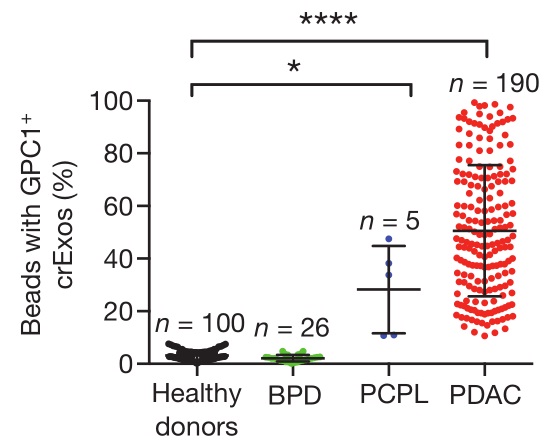Pancreatic cancer is the most deadly of any common cancer, because the disease is often diagnosed in advanced stages and only 15% of patients qualify for surgery. Scientists from MD Anderson Cancer Center found a novel blood test, which could diagnose pancreatic cancer early[1].
Cells often secrete some small particles containing proteins and nucleic acids into the blood. These particles are called exosomes. The researchers found that exosomes from cancer cells harbored high levels of glypican-1 (GPC1), a cell surface proteoglycan.
The researchers analyzed blood samples from 190 pancreatic cancer patients, 32 breast cancer patients and 100 healthy donors. All pancreatic cancer patients revealed high levels of GPC1 positive circulating exosomes (GPC1+crExos).
BPD: benign pancreatic disease; PCPL, pancreatic cancer precursor lesions; PDAC, pancreatic ductal adenocarcinoma.
GPC1+crExos are superior to the commonly used CA19-9 biomarker. Patients with benign pancreatic disease (BPD) exhibited similar GPC1+crExos levels to healthy donor. However, CA19-9 levels were significantly increased in patients with BPD.
Furthermore, the GPC1+crExos test could detect pancreatic cancer at early stage before the disease could be diagnosed by magnetic resonance imaging (MRI). If pancreatic cancer is diagnosed at an earlier stage, curative surgery could reduce the death rates significantly.
Routine screening for pancreatic cancer using MRI or CT would be prohibitively expensive and associated with a high false-positive rate. The GPC1+crExos test would be feasible and enhance the accuracy of MRI or CT scans.
[1] Nature. 2015, doi:10.1038/nature14581.
